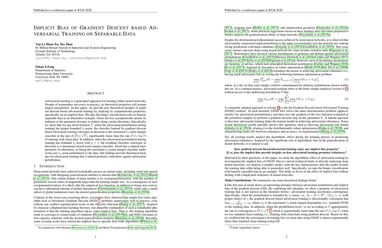Implicit Bias of Gradient Descent based Adversarial Training on Separable Data
Adversarial training is a principled approach for training robust neural networks. Despite of tremendous successes in practice, its theoretical properties still remain largely unexplored. In this paper, we provide new theoretical insights of gradient descent based adversarial training by studying its computational properties, specifically on its implicit bias. We take the binary classification task on linearly separable data as an illustrative example, where the loss asymptotically attains its infimum as the parameter diverges to infinity along certain directions. Specifically, we show that for any fixed iteration $T$, when the adversarial perturbation during training has proper bounded L2 norm, the classifier learned by gradient descent based adversarial training converges in direction to the maximum L2 norm margin classifier at the rate of $O(1/\sqrt{T})$, significantly faster than the rate $O(1/\log T}$ of training with clean data. In addition, when the adversarial perturbation during training has bounded Lq norm, the resulting classifier converges in direction to a maximum mixed-norm margin classifier, which has a natural interpretation of robustness, as being the maximum L2 norm margin classifier under worst-case bounded Lq norm perturbation to the data. Our findings provide theoretical backups for adversarial training that it indeed promotes robustness against adversarial perturbation.
PDF Abstract
